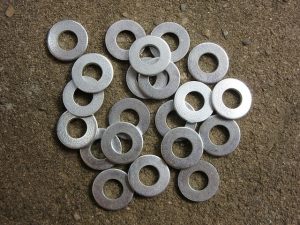
Many people assume that washers and gaskets are the same. After all, they both consist of a similar design, and they are both used in conjunction with other objects. While they may look similar, though, washers and gaskets serve completely different purposes. For a better understanding of washers and gaskets, including how they differ, keep reading.
What Is a Washer?
A washer is a type of disc-shaped fastener with a hole in the center. They are typically used to distribute the load of a threaded fastener, such as a bolt. You can slide a bolt through the hollow center of a washer, after which you can twist or otherwise install the bolt on an object. The washer will then distribute the bolt’s load across its disc-shaped surface.
Common types of washers include the following:
- Plain washers
- Spring washers
- Locking washers
- Torque washers
- Cupped washers
- Toothed washers
- Tab washers
- Wedge lock washers
What Is a Gasket?
A gasket is a sealing device that’s used to prevent leaks around the mating surface where two or more objects meet. They typically aren’t used with fasteners. Rather, gaskets are used with machines and machinery components. Gaskets are designed to prevent substances from leaking around the mating surface of various objects. Machines often have passages through which air, oil, coolant or other fluids and gases travel. The mating surfaces between these passages are equipped with a gasket to prevent them from leaking.
Common types of gaskets include the following:
- Spiral-wound gaskets
- Constant seating gaskets
- Flange gaskets
- Soft-cut gaskets
Differences Between Washers and Gaskets
Washers and gaskets are the same. Washers are used to distribute the load of a threaded fastener, whereas gaskets are used to prevent leaks around mating surfaces. Most washers won’t prevent fluids or gases from leaking; they will only distribute the load of the fastener with which they are used. For sealing applications, you’ll need to use a gasket.
The size and shape of washers also differ from that of gaskets. Most types of washers consist of a uniform circular shape. This circular shape allows them to fit into bolts. They are also relatively small as well. Washers must be small enough to accommodate a bolt. Gaskets aren’t used with bolts. Therefore, they are available in a wider range of sizes and shapes.
Both washers and gaskets are available in different materials. With that said, washers are almost always made of metal. You can find them in aluminum, carbon steel, stainless steel, copper, brass and more. In comparison, gaskets are available in metals and metal alloys as well as rubber and other synthetic materials.
